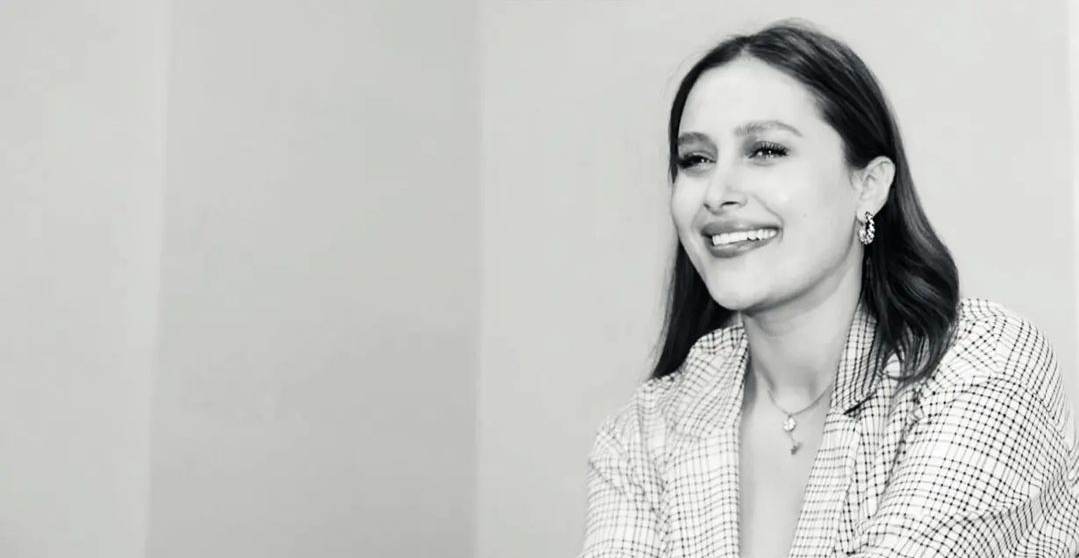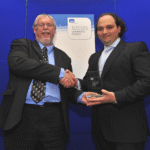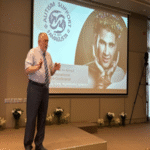
Naghm Na‘asa is a hidden cultural gem in the Syrian arts scene—she has spent her life training actors to perform before the camera. In Syria she founded Stage Art, which has grown into a major company that prepares everyone from actors to broadcasters to CEOs to stand confidently in front of a camera.
A decade of war, death, displacement, and bombing in Syria never stopped Naghm from working in the arts. She and her troupe have taken to the streets—playing music, singing, and performing on sidewalks—restoring hope to the despairing and security to the fearful through their creative work. I met with her and asked:
Q: You specialize in training actors—doesn’t that somehow confine or constrain the art of acting? Isn’t anyone able to act? How did the idea for Stage Art begin, and why did you launch this project?
A: Acting isn’t anyone’s exclusive domain, but the person who trains others in performance (the “acting coach”) creates the fundamental problem we face today. Teaching acting isn’t like teaching mathematics: it involves imagination, concentration, and inventing a character from scratch.
From its inception eight years ago, Stage Art’s mission was to bring together the most distinguished actors and trainers so that we could be a single casting company—one that any production company could work with throughout the year—while ensuring that the essence of every performance is genuine (and extensively crafted).
Today, however, we see acting schools run by people with no real connection to the profession!
Q: That proliferation of unqualified trainers—what effect does it have?
A: The sheer number of “trainers” with no real acting background makes you curse art and regret all the effort poured into creating something true in a sea of deceit. Some trainers think only of themselves, not of the field as a whole, and the result is inevitably disappointing: actors whose origins and motivations are unclear.
Q: Stage Art has achieved many milestones—what do you consider your greatest?
A: By God’s grace, we’ve reached major international festivals by training people who knew nothing of acting. Ultimately, everyone has the right to become an actor, because the craft is about discovering oneself and truth. But it demands tremendous work from coach, actor, and production company—months of preparation before filming and relentless effort during it. What we see today is not only fake but frightening for the future! All the so-called “young stars” sound the same, react the same, and deliver the same performance across ten different series. Who trains them? Who works with them? Who gives them these shallow opportunities?
Q: What’s your view of Syrian drama today? You’ve described it as the phoenix rising again—do you still see it that way?
A: I’ve said before that drama dies with the death of its true writers and directors. We no longer see works that carry deep intellectual values beyond being a 30-episode series that ends as if nothing happened. We need drama that preserves our memory, present, and future; that educates us on every level—this is art’s role: to live on, to shift societal concepts, and to foster a culture built on diligent research and effort.
There have been some respectable productions this year with significant, promising investment from certain production companies. But will it last? Will other companies be influenced by this genuine approach and uphold it? In the end, every successful work is rooted in careful study of text and concept—works that provoke questions in the viewer and even among the performers themselves. I truly hope these efforts intensify. We must respect the audience’s intelligence and the inspiring young talents, who prove daily they can convey real life on screen. Opportunities must be open to all—writers, actors, and directors alike—and the same few names shouldn’t appear in every project. We often hear, “What a wonderful performance—where have they been hiding?” The real question is: Where did you hide them, and why? If we don’t break free from selfishness and individualism—“just turning the screws”—we’ll never succeed. Collective work is the path to success, and though it demands great patience over a long journey, patience has always been our companion.
Q: Why have you remained relatively “hidden” from artistic work? I call you Syria’s hidden cultural document. Why does anyone not on television seem less active in the arts?
A: Many young people sit at home, waiting for a single chance, believing they’re among the first in acting. I never waited for opportunity—I created it through my own sweat and toil over years. This profession requires patience and effort, but not only in the TV queue. Anyone can forge their own path if they dedicate themselves and chase ambitions that aren’t confined to a single outlet—especially in the vast sea of art.
War didn’t stop us: I launched three major artistic initiatives in Syria from 2013 onward—the “Wamda” project, the Stage Art company and center, and the “Theatre for Change” project with the UNDP. I’ve taught acting for over ten years through training and workshops. This hidden cultural document will one day emerge publicly at a time and place of my choosing.
As Muhammad Sobhi said, “Cameras only go toward the trivial, my friend.” True artistry builds a strong, enduring structure—either you clad it well, or it’ll crumble the moment you stop renewing and preserving it.
Q: What about the films you participated in that screened at Cannes and won awards?
A: At Stage Art Group in the UAE, we collaborate with international companies to train core cast members—often people new to acting—from zero to camera-ready. We also strive to create deserving opportunities for youth that focus on exploring their inner worlds over the long term rather than instant fame. A key example is our work with actress and model Siran Riak on the Sudanese film Farewell Julia, directed by Mohamed Kordofani and produced by Station Films. It was the first Sudanese film ever selected at Cannes and won the Freedom Award—congratulations to them and to us for that collective achievement. We have many more important partnerships in the pipeline, which we’ll discuss in due time.






